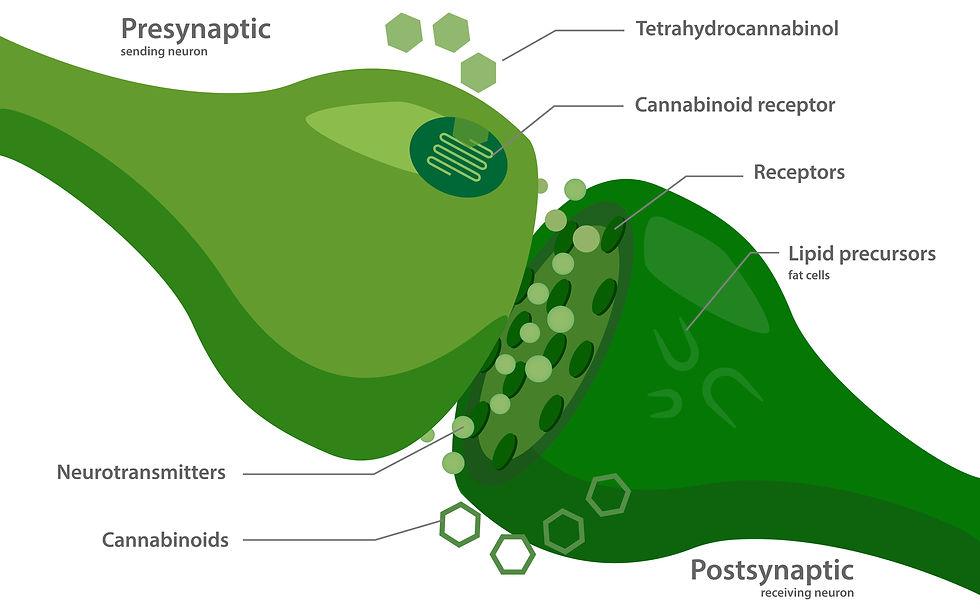Marijuana (Cannabis sativa) in Dogs
- Dr Andrew Matole, BVetMed, MSc

- Jul 26, 2021
- 3 min read
Updated: Aug 6, 2021
Synonym(s): Hemp, Hashish, Ganja, Mary Jane, Pot, Grass, CBD, THC, Weed, Marihuana
Introduction

Marijuana comes from the plant Cannabis sativa or marijuana from another member of the Cannabis family, Cannabis indica. The cannabis plant contains over 60 chemicals called cannabinoids, the main types being cannabidiol (CBD) and tetrahydrocannabinol (THC). CBDs are therapeutic cannabinoids, while THC is the cannabinoid that causes highness.

Marijuana Vs Hemp
Marijuana’s THC content is usually between 10 and 15 per cent, but hemp must have a THC content of 0.3 per cent or less. At this level, cannabis has no intoxicating effect, for people or dogs. Hemp is higher in CBD, the substance that provides therapeutic effects.

How do cannabinoids work?

The cannabis plant contains a variety of different chemicals that include:-
Cannabidiol (CBD),
Phytocannabinoids,
Terpenoids and
Flavonoids.

Mammals, including humans, have specific cannabinoid receptor sites that are primarily in the brain and central nervous system, and in peripheral organs, especially immune cells making up what is called the endocannabinoid system.
What are the benefits of cannabis in dogs?

Cannabinoids can help with both chronic and acute diseases. Some of the conditions include:-
Appetite stimulation,
Improved immune systems,
Stress responses,
Aggression
Digestive issues.
Type 1 diabetes,
Organ diseases,
Cancer,
Sprains and strains,
Torn ligaments,
Fractures and
Post-operatively to reduce swelling, pain and stiffness,
Neurological disorders
Skin conditions,
Dogs on conventional drugs for any of the above conditions, cannabis enables lower doses of the drugs to be used to achieve therapeutic effects minimizing side effects of conventional medicines. Excessive ingestion of cannabis can lead to poisoning.
Available products

Hemp or CBD oil.
CPD pet biscuits and treats.
CBD gummies.
CBD topical creams and ointments.
CBD 300 mg capsules.
CBD vaporizers.
CBD bath bombs.
CBD chocolate bars.
What does Kenyan Law say about marijuana?

Kenya’s Narcotic Drugs and Psychotropic Substances (Control) Act states that:
“Any person who has in his possession any narcotic drug or psychotropic substance shall be guilty of an offence.” This includes cannabis.

At the time of writing this article, the law regarding medicinal cannabis states:
“A medical practitioner or dentist shall not— (a) prescribe for, administer, sell or supply to, any person any narcotic drug or psychotropic substance; or (b) sign any prescription or order for the supply of any narcotic drug or psychotropic substance to any person, unless the narcotic drug or psychotropic substance is required for the medical or dental treatment of the person.”

The laws might change following the introduction of the Marijuana Bill 2018 in Kenya's National Assembly that seeks to decriminalise cannabis and permit its medical use.
References
Osweiler, G. D., Hovda, L., Brutlag, A., & Lee, J. A. (Eds.). (2011). Blackwell's Five-Minute Veterinary Consult Clinical Companion: Small Animal Toxicology. John Wiley & Sons.
Kogan, L., Schoenfeld-Tacher, R., Hellyer, P., & Rishniw, M. (2019). US veterinarians' knowledge, experience, and perception regarding the use of cannabidiol for canine medical conditions. Frontiers in veterinary science, 5, 338.
Meola, S. D., Tearney, C. C., Haas, S. A., Hackett, T. B., & Mazzaferro, E. M. (2012). Evaluation of trends in marijuana toxicosis in dogs living in a state with legalized medical marijuana: 125 dogs (2005–2010). Journal of Veterinary Emergency and Critical Care, 22(6), 690-696.
Janczyk, P., Donaldson, C. W., & Gwaltney, S. (2004). Two hundred and thirteen cases of marijuana toxicoses in dogs. Veterinary and human toxicology, 46(1), 19-20.
Brutlag, A., & Hommerding, H. (2018). Toxicology of marijuana, synthetic cannabinoids, and cannabidiol in dogs and cats. Veterinary Clinics: Small Animal Practice, 48(6), 1087-1102.
Fitzgerald, K. T., Bronstein, A. C., & Newquist, K. L. (2013). Marijuana poisoning. Topics in companion animal medicine, 28(1), 8-12.
The Narcotic Drugs and Psychotropic Substances (Control) Act, 1994
Website(s)
AVMA: Cannabis use and pets: www.avma.org/KB/Resources/Reference/Pages/Cannabis-Use-Pets.aspx.








Comments